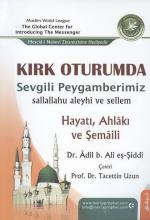Rahmet peygamberi Sitesi
Dünya İslam Birliği - Uluslararası Peygamberi Tanıtma ve Destekleme Komisyonu
Although Abu Sufyan was to eventually embrace Islam, for most of his career during the life of the Prophet r, he was bitterly opposed to it. He was the leader of the Umayyad clan of the Quraysh tribe and was the chieftain of the entire Quraysh tribe, making him one of the most powerful men in Makkah during the lifetime of Muhammad r. His great-grand father was Abdul Shams ibn Abd al-Manaf, whose brother was Hashim, the great-grandfather of the Prophet r, so there was a distant cousin relationship between them. It was Abu Sufyan’s position that made him an enemy of the Prophet r, whom he viewed as a threat to his power and a blasphemer of the Quraysh gods. The enmity between the Quraysh, of whom Abu Sufyan was a prominent leader, and the early Muslims reached such heights that many battles were fought between the two parties after the Muslims settled in Madinah in which he participated, and it was he who led the army of Quraysh in the Battle of Uhud in 625CE. After the Treaty of Hudaibiyyah in 628CE, he took a trading caravan to Greater Syria, and was called to Caesar in Jerusalem. Meanwhile, the treaty with Muhammad r was broken by allies of the Quraysh while Abu Sufyan was on the way back to Makkah. Knowing the Muslims were now free from the treaty made a year and a half earlier, he personally went to Madinah to try and patch it up, but came away empty handed. The Muslims subsequently attacked Makkah in 630CE. Seeing the writing on the wall, Abu Sufyan fled the city, but later returned in order to embrace Islam.
The Prophet r and the Emperor
The Prophet r and the Emperor Heraclius were contemporaries. Born only 5 years apart, they both lived into their sixties. The reign of Heraclius was marked by ups and downs in military success.
In 609CE, when he was 40, Muhammad r received the first revelations that marked the beginning of his Prophetic mission. In 610C.E. Heraclius deposed Procus as Emperor and took his place, but the beginning of his reign was marked by the defeat of his armies in Palestine and Turkey between 614 and 619CE. These defeats, and the subsequent victory the Romans would enjoy, were mentioned in the Qur'an at the time:
“The Romans have been defeated in the nearer land; and they, after their defeat, will be victorious. Within three to nine years.” (Qur'an, 30:2-4)
The re-conquest by the Romans of the lands ceded to Khosrau started in 625 and ended in triumph in 627CE. The following year, Muhammad r, sent the following letter to Heraclius by the hand of Dihya al-Kalbi, by way of the governor of Bostra al-Sham, in Syria.
The Letter
The letter Muhammad r sent is incorporated in the narration of Abu Sufyan, and I reproduce it below word for word as Heraclius read it out before all his Grandees.
In the name of God, the Beneficent, the Merciful.
This letter is from Muhammad the servant of God and His Messenger to Heraclius, the ruler of the Byzantines.
Peace be upon him who follows the right path.
I am writing this invitation to call you to Islam. If you become a Muslim you will be safe and God will double your reward, but if you reject this invitation of Islam you will bear the sin of having misguided your subjects. Thus do I urge you to heed the following:
“O People of the Scriptures! Come to a word common to you and us that we worship none but Allah and that we associate nothing in worship with Him, and that none of us shall take others as Lords beside Allah. Then if they turn away, say: Bear witness that we are Muslims.”
Muhammad, the Messenger of God
In contrast to Khosrau II, who had been sent a similar letter earlier, the Byzantine Emperor Heraclius kept the letter and sought to find confirmation concerning what it contained. This is quite different to the treatment accorded to his letter to Khosrau II of the Sassanid Empire. According to ‘Abdullah ibn Abbas y, the latter was sent with ‘Abdullah ibn Hudhayfah al-Sahmi by way of the Governor of Bahrain.
The Sassanid Empire was to utterly dissolve almost immediately, first through the defeat by the Romans, and then by the onslaught of the new Muslim nation. The Byzantine Empire, too, while still under Heraclius, dissolved in Egypt, Palestine and Syria. However, unlike the Sassanid Empire, the Byzantine Empire continued on in various forms for another 800 years until Constantinople finally fell, and this may be because of the contrast in the way each of the letters was received.
Source: http://www.islamreligion.com/a
Edited by the Prophet of Mercy team
******
Gözde içerik
Tüm zamanlar:
- PEYGAMBERİMİZ (SAV)'İN AHİR ZAMAN ALAMETLERİ HAKKINDA BİLDİRDİKLERİ
- SAFER AYI HAKKINDA BAZI BİLGİLER
- PEYGAMBER EFENDİİMİZİN ÇOCUKLARA OLAN İLGİSİ VE ŞEFKATİ
- شعار الهئية
- Dr. Zakir Naik
- الشيخ عبدالرحمن الشربتلي
- Parents should be respected
- hazreti_muhammad
- yururken dikenli bir dali gorunce onu alip yoldan kaldirdi
- Руководство Мухаммада


